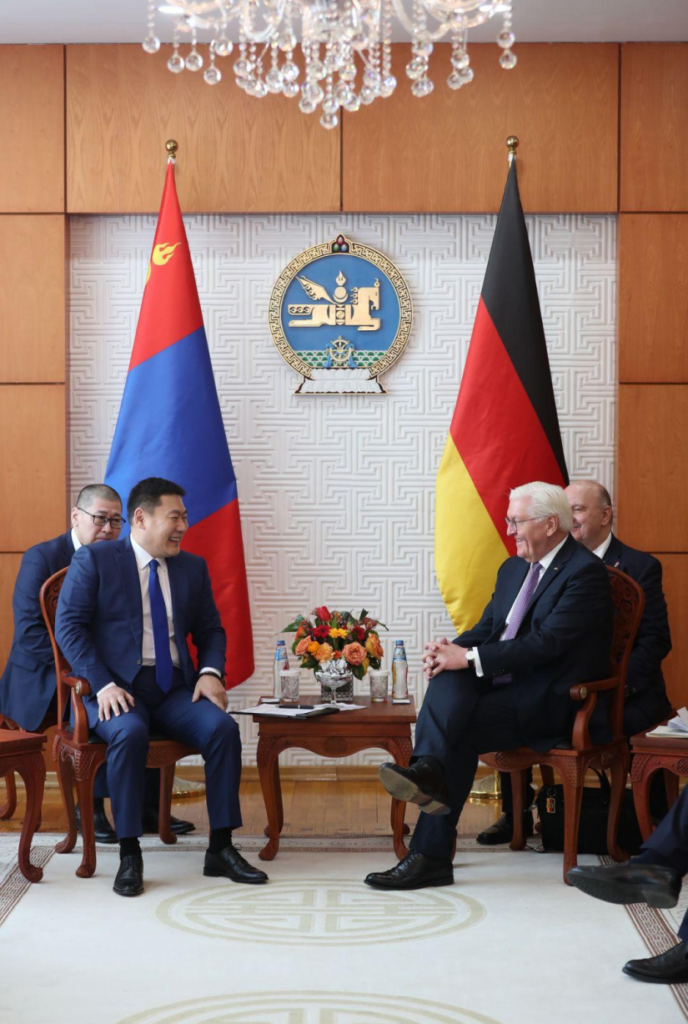
On February 7-8, 2024, the President of the Federal Republic of Germany Frank-Walter Steinmeier paid a visit to Ulaanbaatar. In the course of the visit, the senior German politician held talks with Mongolia’s President, Prime Minister, and the Speaker of the State Great Khural, Mongolia’s Parliament. He was met at the airport by Mongolia’s Foreign Minister.
The visit was, more or less, timed to coincide with the fiftieth anniversary of the establishment of diplomatic relations between Mongolia and the Federal Republic of Germany.
During the talks between the German President and the Speaker of the State Great Khural of Mongolia, both parties spoke highly of German political specialists’work in drafting parliamentary reform projects for Mongolia and the wide-ranging expertise which they had demonstrated in their proposals to promote gender equality in the Mongolian political system. They also referred to the long-standing support provided by German state authorities and, even more, German NGOs for the development of democracy in Mongolia. Among the latter, the most active are the Konrad Adenauer Foundation and the Friedrich Ebert Foundation, which have been monitoring public opinion and analyzing political processes in Mongolia for decades.
During his talks with the German President, the Mongolian Prime Minister paid special attention to the partnership between the two countries in the field of tourism. Mongolia is clearly hoping to attract visitors from Germany as part of its Years of Visiting Mongolia program. However, in this conversation Steinmeier showed more interest in other issues, in particular, the prospects for cooperation in the energy sector.
In his address to his German guest, the Mongolian President stressed the special successes in the two countries’ cooperation in the field of education, emphasizing the importance for Mongolia of the numerous programs and scholarships provided to its citizens by German universities. He also thanked Germany for its effective cooperation through UN peacekeeping missions, and for the more than 500 million euros in “development aid” that it has invested in Mongolia since the early 1990s.
Significantly, during the talks the German President did not attempt to “encourage” his Mongolian colleagues to make any political statements or take any steps that could harm Mongolia’s relations with Russia or China. His agenda and rhetoric was thus in sharp contrast to that of Emmanuel Macron, who visited Ulaanbaatar last year to “make Mongolia feel free from pressure on the part of its neighbors.”
The key document signed at the end of Steinmeier’s visit was a joint declaration on upgrading relations between Germany and Mongolia to the level of a strategic partnership. The text of the declaration includes the traditional statements in documents signed by the two countries: stressing “Mongolia’s support for Germany’s permanent membership in the UN Security Council” and referring to the “development of cooperation between the two countries on the implementation of Mongolia’s Long-term Vision 2050 program” etc. Significantly, the declaration also reflected Mongolia’s aspiration to involve Germany in large mining and industrial projects in the country. The declaration also noted both countries’ interest in working together on the construction of wind and solar power plants and green hydrogen production projects. Nevertheless, despite these statements in the document which represents the main achievement of Steinmeier’s trip to Ulaanbaatar, relations between the two countries remain heavily focused on humanitarian projects – a sharp contrast to Mongolia’s relations with a number of its other Western partners, in which investment in mining, transportation or energy projects plays an important role.
Nevertheless, it was Germany that was Mongolia’s first strategic European partner, and its seventh privileged partner after India, the United States, Japan. the Republic of Korea, and its ever-present neighbors Russia and China, which remain one step above the others in the Mongolian foreign policy hierarchy. It may seem counterintuitive that Germany holds the prime position among Mongolia’s European partners, as the German President’s trip was not marked by the kind of high-profile agreements and contracts that accompanied the exchange of visits between the French president Emmaunuel Macron and Mongolia’s Ukhnaagiin Khürelsükh in 2023. Germany’s special position is probably due to the fact that the debate on upgrading its relations with Mongolia has been going on for longer s – the countries have been comprehensive partners since 2008, and the topic of elevating Germany’s status has been on the table for the last five to seven years. Moreover, while there are no major economic projects between the two countries under way in Mongolia, Germany is the largest European exporter to the country, accounting for 3.7% of its gross imports in 2023. It is also likely that the “non-politicized” nature of the German-Mongolian partnership also plays an important role.
Nevertheless, the elevation of relations between Mongolia and Germany to a new level can be seen as a kind of progress, in that it is a clear sign of the two countries’ hopes (although, naturally, more on Mongolia’s side than on Germany’s) that their partnership will continue to develop in a wide variety of sectors. Mongolia’s experience with Germany may also become a model for the successful development of depoliticized cooperation between nations – an example of successful dialog which may be useful for other Western partners.
Shortly after Frank-Walter Steinmeier’s visit to Mongolia, there were other bilateral events. In early March 2024,Germany’s Federal Minister for Digital Infrastructure and Transport visited Ulaanbaatar, where he signed a “memorandum” with the Mongolian Minister of Road Development and Transport and discussed prospects for training Mongolian specialists in Germany. The two countries also signed an agreement on road transport and discussed the possibility of increasing number of direct flights between the two countries.
Boris Kushkhov, the Department for Korea and Mongolia at the Institute of Oriental Studies of the Russian Academy of Sciences, exclusively for the online magazine “New Eastern Outlook”